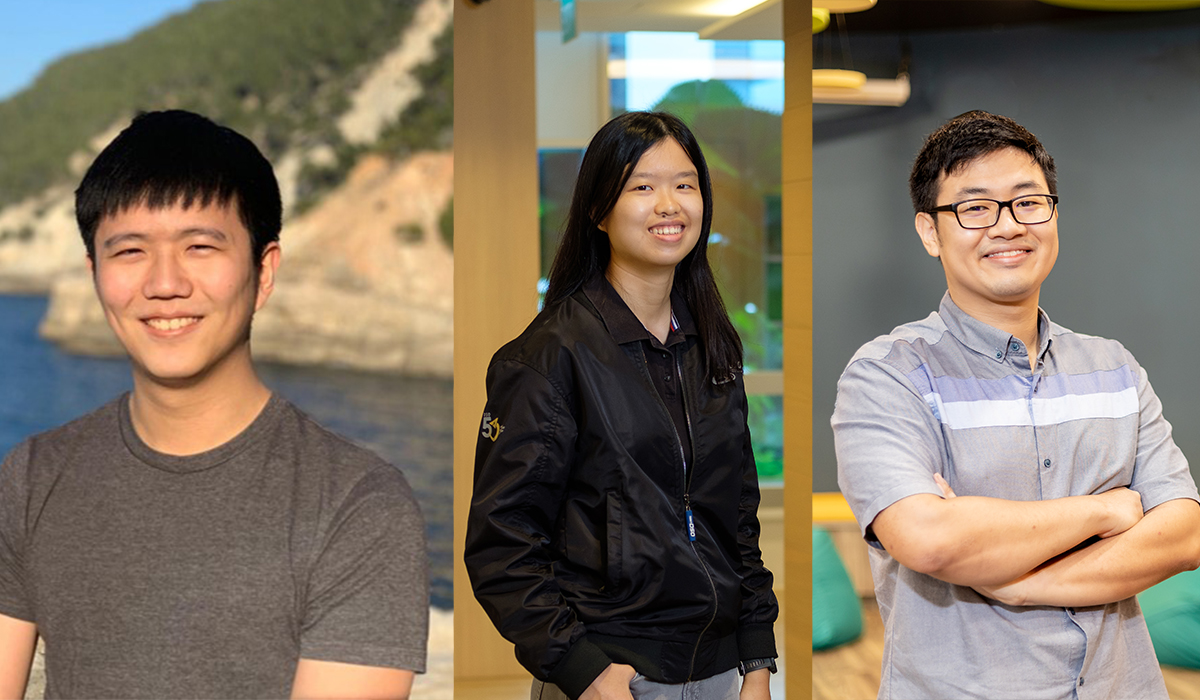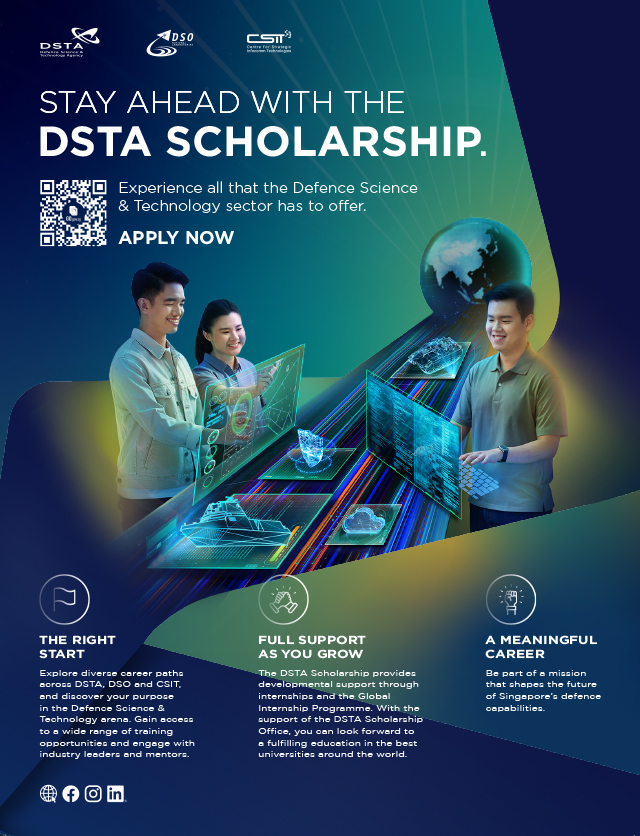Left: Joel Yeow is involved in software development as a Senior Engineer in DSTA's Information Programme Centre. He is a recipient of the DSTA Scholarship, and holds a Master and Honours (First Class) in Electrical and Electronics Engineering from Imperial College London.
Middle: Tay Jing Xuan is a software engineer and part of the Unmanned Surface Vessel (USV) team under the Robotics Autonomy Programme in DSO. She is a recipient of the DSTA Scholarship and holds a Bachelor of Engineering (Computer Engineering) from NUS.
Right: Leon Zhi-Wei Nathaniel is an Infocomm Infrastructure Security Engineer, dealing with malware detection at CSIT. He is a recipient of the DSTA Scholarship and holds a double major in Bachelor of Mathematics and Computer Science from Carnegie Mellon University.
The defence science and technology sector is an interdisciplinary collective of defence technologists and engineers dedicated to safeguard Singapore’s national security by pushing the boundaries of science and cutting-edge technology.
Among its ranks are Joel Yeow, Tay Jing Xuan, and Leon Zhi-Wei Nathaniel, who also get to realise their professional aspirations in exciting domains from engineering, digital technology to cybersecurity as recipients of the DSTA Scholarship.
With diverse career tracks available in the DTC – comprising the Defence Science and Technology Agency (DSTA), DSO National Laboratories (DSO), and the Centre for Strategic Infocomm Technologies (CSIT), the DSTA Scholarship provides a meaningful and challenging career for those keen to make an impact on Singapore’s defence.
Joel is a Senior Engineer at DSTA’s Information Programme Centre, a top-notch technology organisation that drives innovation and delivers state-of-the-art capabilities to make the Singapore Armed Forces (SAF) a formidable fighting force.
Jing Xuan is a software engineer and is part of the Unmanned Surface Vessel (USV) team under the Robotics Autonomy Programme in DSO, Singapore’s largest defence research and development (R&D) organisation with the critical mission to develop technological solutions to sharpen the cutting-edge of our national security.
Nathaniel is an Infocomm Infrastructure Security Engineer in CSIT, a technical agency in the Ministry of Defence (MINDEF) that harnesses cutting-edge digital technologies to meet Singapore’s security needs.
We caught up with them to find out more about their scholarship and career journeys.
How did you find out about the DSTA Scholarship and what made you accept it over other options?
Joel: I have always been interested in defence science after reading about how many influential and ubiquitous innovations originated from defence or government-related projects, such as the internet and GPS. When I found out about the DSTA Scholarship from my junior college teacher, I was attracted to it immediately as I would get to explore my interest. Beyond that, it offered a unique opportunity to work alongside engineers in top multinational companies through its Global Internship Programme!
Jing Xuan: As a student, I participated in numerous DSO outreach events, such as the World of Science workshops and Research@YDSP internship, which sparked my interest in defence R&D and introduced me to the various scholarships available including the DSTA Scholarship. After a pre-university internship with DSO, I was intrigued by the interesting and unique work that DSO does and decided to pursue a career with DSO through the DSTA Scholarship.
Nathaniel: I took part in the Young Defence Scientists Programme (YDSP) when I was in secondary four and became acquainted with the DTC early on. So, when I found out about the DSTA Scholarship from my junior college, I decided to apply for it as DSTA Scholars can be deployed to any of the three DTC agencies – DSTA, DSO and CSIT!
Joel, you mentioned about the Global Internship Programme. Tell us more.
Joel: Through the programme, I got to intern in Samsung SDS in Seoul, South Korea, where I worked on the development of a deep neural network for detecting breast cancer. The internship gave me the chance to work and live overseas, which was an eye-opening experience for me. The project also exposed me to real-world applications of image processing, which was the domain I specialised in university.
Can you share some ways that the DSTA Scholarship has benefited your studies?
Joel: The scholarship provided me with an overseas education where I was able to build a strong technical foundation in my domain of work. I was also well supported during my studies through a buddy system, where senior DSTA Scholars in the same institution were paired with younger ones to foster a stronger sense of community and nurture lasting bonds. In fact, many of us are still friends and colleagues today! The DSTA Scholarship Office was also very supportive throughout my overseas university education, checking in with me and arranging for meetups with other DSTA Scholars.
Jing Xuan: The DSTA Scholarship offers opportunities to study and intern at various institutions both in Singapore and overseas. I interned with DSO twice which gave me practical hands-on learning experiences and a glimpse into the life in and outside of the lab.
Nathaniel: I was awarded the overseas scholarship and CSIT helped to link me up with the other scholars who were studying in the same university, which was very helpful since I was studying in the United States alone.
I also found the internship with CSIT very useful as it allowed me to uncover new areas that I was interested in. This included computer architecture, which led me to take up a related course in university and expand my knowledge on computing topics.
What are the key takeaways from your studies and how do they apply to your current work?
Joel: While my degree in Electrical and Electronics Engineering gave me deep technical expertise, it also showed me that it is important to be open to new experiences and be willing to learn. The tech landscape is constantly changing, with new technological advances always on the horizon. With the breadth of projects DSTA undertakes, I am challenged to keep learning and honing my competencies. The communication and interpersonal skills I picked up during my studies have also been useful when I collaborate with others in DSTA.
Jing Xuan: While it may sound cliché, learning to learn is the most important skill. The work at DSO often includes developing technological solutions that are either not available in the market, or are unique to Singapore’s needs. As such, there is a constant need to explore and learn new ideas and algorithms, not just in my own domain but also others. This has certainly been useful both during my internships and current work as it drives me to learn and work better with the systems that my team developed, find and debug issues that occur during development, as well as search for and test out new algorithms.
Nathaniel: My Computer Science course in university had very challenging programming exercises. One such exercise was writing Malloc, a library function that allocates memory from scratch. These exercises helped me to build strong programming fundamental skills that are important for my work now.
Joel, tell us more about your role as a Senior Engineer in DSTA.
Joel: At Information Programme Centre, we harness advanced technologies in areas such as artificial intelligence, data analytics, and cybersecurity to develop information systems and solutions for MINDEF and the SAF.
A large part of my work revolves around software development, where I develop deep neural networks for analytics. Such interconnected networks learn and react to data through complex calculations and sophisticated math modelling, which helps in a variety of tasks including image classification and language translation. I am also responsible for full stack web development, such as improving user interfaces and building application workflows.
One of my career highlights was when I developed a suite of image analytic tools by integrating different open-source tools, and creating a system that could sieve through large quantities of data for relevant information. This gave me the chance to tap various sources of knowledge, including my technical knowledge from university as well as the extensive experiences from senior team members. I hope to continue exploring new technologies to create impactful solutions that would benefit our nation’s defence and security, while also inspiring more students to take up a career in defence technology.
Jing Xuan, you develop software for maritime robotics autonomy in DSO. Tell us more about your work.
Jing Xuan: I have great interest in robotics! So, when I got to know about DSO’s Robotics Division, I indicated my interest to join and was assigned to the Unmanned Surface Vessel (USV) team under the Robotics Autonomy Programme.
Together with my team, I help to develop autonomy software for USV that meets the requirements of the Navy. My work has its unique challenges with our congested waters and the need to obey the Convention for International Regulations for Preventing Collisions at Sea (COLREGs) when navigating the open seas.
Nathaniel, your work in CSIT deals with malware detection. What is your most significant achievement to date?
Nathaniel: A significant achievement for me was when I first successfully uncovered the workings of a malware through conducting static and dynamic analysis and applying reverse engineering techniques on the malware.
Reverse engineering of malwares is an area in cybersecurity that I particularly like. Trying to figure out the workings behind a malware is a difficult but enriching experience because it allows me to develop effective solutions against the malware.
Knowing that my role in malware detection supports CSIT in protecting Singapore’s key infrastructure and systems is something that I am very proud of!



